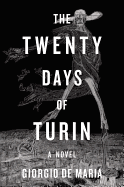
Intertwining the present and the past, Giorgio De Maria's cult novel of societal breakdown, The Twenty Days of Turin, appears in English for the first time, smartly translated by Australian writer Ramon Glazov. A nameless office worker is obsessed with events of a decade earlier, when a mysterious collective created a secret and ultimately dangerous library. Ominous messages and suspicious activity convince the narrator that the same forces are regrouping. "A business we believed was over and done with is coming back into motion with a coldness, a clarity, which would have been unthinkable in the time of the Twenty Days...."
Ten years prior, this group amassed diaries and journals from willing citizens who allowed others to read their offerings: "The prospect of being read quivered in the distance like an enchanting mirage." Unsettling events occurred. Mass insomnia overtook the citizens of Turin. A deep feeling of unease and dissatisfaction infiltrated society. This culminated in a terrifying 20 days, when hundreds of people were randomly and horrifically murdered. After that, the library was supposedly destroyed--but was it?
Italian novelist and playwright De Maria wrote this during the 1970s, when terrorism and corruption reigned. He presciently describes a society where human connections are decreasing, where spilling personal information becomes addictive, and where "browsing the thoughts of others" brings voyeuristic pleasure as well as unknown risks. De Maria gives mundane events menacing undercurrents, bringing to mind H.P. Lovecraft and Shirley Jackson. Readers will recognize the contemporary social media landscape portrayed in this cautionary, relevant novel. --Cindy Pauldine, bookseller, the river's end bookstore

